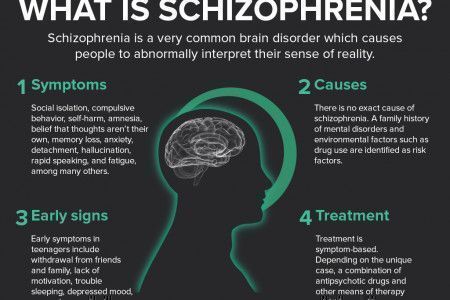How to recognize the symptoms of schizophrenia and how to treat them
Schizophrenia is a serious mental disorder characterized by true alterations in reality such as, to name a few, psychosis, false perceptions, alterations in affectivity, bizarre behavior and disorder in both thought and language.
Although the specific causes are still unknown, this mental illness possesses a biological basis, such as alterations in brain structure and changes in neurotransmitters. In addition, some scholars believe that even the genetic component play an important and decisive role. Schizophrenia is a chronic illness which can progress through several sequential stages, presoft, prodromal, central, and late.
What are the sympoms of schizophrenia?
A psychiatric examination and a comprehensive medical evaluation are required to reach a diagnosis.
Therefore, Before Assuming That One Has Schizophrenia, There are many sympoms to pay attention to.
Syptoms can eye in adolescence and adulthood as well as in later life. About the Advance and Onset of the Disease Can Be Acute and Fast, or Slow and Grail.
In the phase premier Patienti do not exact noticeable Syptoms and Usually Have Mild Cognitive Disorganization and Anhedonia (Lack of Interest in Activities and Minimal Ability to Feel Pleasure).
In the Prodromal Phase Unusual Thoughts, Isolation, and Irritability Begin to Be Incursingly present. At A Later Stage, episodic or Continuous Symptomatic Periods Occhur in Which the Patient, Precisely, Presenti With Psychosis, Hallucinations, Disappointments, Affective Flattening.
The Sympoms of Schizophrenia, However, Are Not Only These. Others includes cognitive deficits, i.and and., Difficulty in Reasoning and Inability to solve problems; incoherent speech; Bizarre Behavior and out of Normal Everyday life. The presentcentce of these Sympitoms causes the collaps of the patient’s self-exastem and self-sag.
In addition, The Effects of the Sympetoms includes Sense of Insadequacy and Agitation affecting the subject, and impairment and difficulty related to the performance of Normal Daily Activities.
The sympoms of schizophrenia can be divided intole Positive Sympetoms and Negative Sympetoms.
Positive Sympetoms, Listing a Few, includes disappointments (Beliefs contrary to actual reality), Hallucinations (alterations in perception Whereby the person Believes he or she perceives situations that do not exist), disagreation of Thinking and fragmentation of thought, and, again, bizarre and disorganized behavior.
Negative Sympoms of the Illness, on the other hand, Includes apathy, emotional shapes, deficits in Productivity and Fluency of speech and expression, loss of Initiative and creativity, Difficulty in concentration, and last but certain not least, Impairement of interpersonal Relationships in Both in Both In Both Work, Social and Personal.
How to treat schizophrenia?
As already written, since the causes of this disease are poorly known treatments are mainly based on the elimination of symptoms. In this regard, the following are used antipsychotics and psychosocial treatments.
Antipsychotics have been available since the 1950s and are known as typical antipsychotics.
In 1990, new antipsychotics were developed, known as atypical or second generation.
Of course, since this is a disease it is advisable to follow the doctor’s advice carefully. Among the effects of antipsychotics Some have been found to disappear within a few days of intake.
the psychosocial treatment proves to be useful only in patients who have been stabilized by therapeutic treatment.


